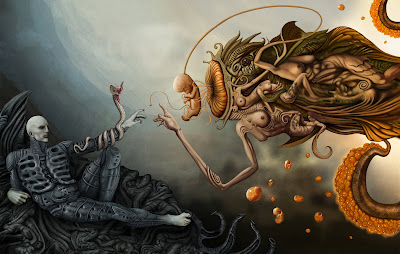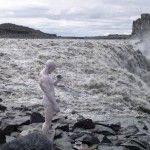Whence Prometheus? I’ll let Wikipedia tell you:
In Greek mythology, Prometheus (Greek: Προμηθεύς) is a Titan, culture hero, and trickster figure who is credited with the creation of man from clay and the theft of fire for human use, an act that enabled progress and civilization. He is known for his intelligence, and as a champion of humanity.
The punishment of Prometheus as a consequence of the theft is a major theme of his mythology, and is a popular subject of both ancient and modern art. Zeus, king of the Olympian gods, sentenced the Titan to eternal torment for his transgression. The immortal Prometheus was bound to a rock, where each day an eagle, the emblem of Zeus, was sent to feed on his liver, which would then grow back to be eaten again the next day. In some stories, Prometheus is freed at last by the hero Heracles (Hercules).
In another of his myths, Prometheus establishes the form of animal sacrifice practiced in ancient Greek religion. Evidence of a cult to Prometheus himself is not widespread. He was a focus of religious activity mainly at Athens, where he was linked to Athena and Hephaestus, other Greek deities of creative skills and technology.
In the Western classical tradition, Prometheus became a figure who represented human striving, particularly the quest for scientific knowledge, and the risk of overreaching or unintended consequences. In particular, he was regarded in the Romantic era as embodying the lone genius whose efforts to improve human existence could also result in tragedy: Mary Shelley, for instance, gave The Modern Prometheus as the subtitle to her novel Frankenstein (1818).
From that you gather all the essential ingredients for a fresh movie based on familiar raw materials. This Prometheus is both the space ship on which the protagonists travel, a reference to the Greek myth, and, also the name of Ridley Scott‘s latest sci-fi movie. Being Ridley Scott, this epic could only be set in the same milieu as the Alien series, though the makers would sooner see this as a separate and parallel set of events rather than a direct prequel. However, as we shall see, the two are far from unconnected.
This one is primarily a tale of evolution which claims to subvert the original theory but I think Darwin would approve – even if the results were somewhat more savage than he might have envisaged. In this world, being the survival of the fittest means becoming better equipped to out populate distant planets like earth, but then reject and threaten to destroy them at will.
Prometheus the movie is set in the late 21st Century, but in the ensuing 77 years from 2012 scientific research space travel has become the norm, but we’re not yet at the stage of commercial space travel to recoup mineral mining on far-flung planets, as in Alien. This sees archaeologists Drs Elizabeth Shaw (the dazzling Noomi Rapace, so brilliant in the original Swedish movie adaptations of Larsson’s Millennium Trilogy but uncomfortable in the second Sherlock Holmes epic) and Charlie Holloway (Logan Marshall-Green) join a mission aboard Prometheus, the space vessel, sponsored by the Wayland Corporation (owned by ancient billionaire Wayland played by an unrecognisable Guy Pearce in prosthetic make-up) to trace the origins of a species that visited earth thousands of years before from a very far-flung planet capable of sustaining life. Wayland’s motive appears, unsurprisingly, to be eternal life.
So the mission, monitored by company drone Meredith Vickers (Charlize Theron) and piloted by Janek (a grizzled and world-weary Idris Elba.) Look around and you’ll see a familiar looking crew including a laid-back Rafe Spall and, by way of contrast, Sean Harris verging on the psychotic (his mindset is later acted out in zombie form, but that’s another story.)
Does any of this ring any bells? We might be missing Sigourney Weaver’s Ripley in favour of Rapace (which I consider to be a change for the better), plus the ship’s cat, but we do have a mightily familiar scenario here – not least a highly intelligent and even Machiavellian android in the personable and charismatic shape of Michael Fassbender. Starting to sound familiar!
So what do the crew do when they arrive on said planet? Obviously they don their space suits and go investigate, finding strange artefacts along the way. These include capsules oozing a dark and murky liquid (a bit like seed pods in fact) and the corpses of bizarre white super-warriors. But what they don’t spot are the tiny worms awoken by their presence; these grow into primitive life forms which will one day evolve into… you guessed it – the alien!!
Ms Vickers is determined to find one of the super-humans still alive and transport it back to earth. As you can expect, things do not go according to plan. Meantime, the terrors start getting worse, horribly mutilated corpses stack up, the ship is contaminated and escape is the only option, though that proves less than easy as the living creature proves less than hospitable and the slimy tar-dwellers grow up into nasty inhabiters of human stomachs. Yes, there is some blood and gore here, nothing more unwatchable than Rapace having to perform a Caesarian Section on herself (yes, you do read that correctly!)
Visually, it’s done well as you would expect from Scott, though I wish it had not stuck so rigidly to the same formula. Granted the special effects here are light years ahead of the original Alien, but the plot is essentially an evolution into a slightly more advanced life-form, with a few added bells and whistles. No, more than that: Scott throws the kitchen sink at the altar of Prometheus, not always for the better. Less is sometimes more.
Maybe that’s just how Hollywood folk think things should be – if it ain’t broke and all that. I’m quite sure Mr Scott has now started a highly profitable reworking of the franchise that will go on to see years more of success to take up from where the Alien quadrilogy left off. I also hope his inventiveness extends to reworking the formula into something novel and original, but I won’t build up my hopes too high. One word about the movie that should leave you gagging for more though is that it looks ravishing. Some of the locations (including Scotland) and space shots are utterly sublime!
But as a drama… Prometheus is over-complicated, dull, ponderous, much given to pontificating and theologising to compensate for its lack of coherence; the script is flat, humourless and contains no hint of a spark – many characters witter on about mythology in much the same way you would expect of Lord of the Rings. This is not Scott’s best work by a long chalk, so if you were expecting another Alien, Blade Runner or Gladiator, think again.













